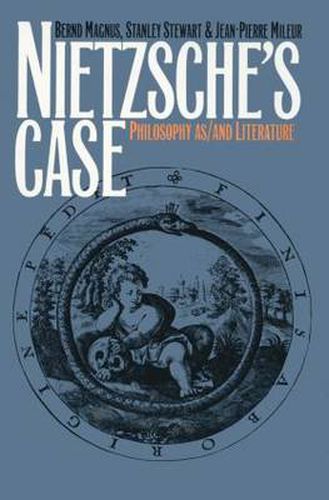Readings Newsletter
Become a Readings Member to make your shopping experience even easier.
Sign in or sign up for free!
You’re not far away from qualifying for FREE standard shipping within Australia
You’ve qualified for FREE standard shipping within Australia
The cart is loading…






Nietzsche’s Case combines the multiple perspectives of Bernd Magnus, a philosopher and Nietzsche a scholar, Jean-Pierre Mileur, a critical theorist/Romanticist, and Stanley Stewart, a Renaissance literary scholar. Conceptually, it occupies the interface of philosophy and literature. Nietzsche’s texts are brought into dialogue with the New Testament and texts by Sidney, Bacon, Spenser, Milton, Shakespeare, Browning, Coleridge, Wordsworth, Blake, Carlyle, and Lawrence, as well as with the standard texts of the philosophical and critical traditions from Plato to Derrida. Nietzsche claimed that every great event constitutes the personal confession of its author and a kind of involuntary and unconscious memoir. Magnus, Mileur and Stewart reveal the greatness of Nietzsche’s philosophical achievement and at the same time unravel the unconscious and involuntary memoir it constitutes. Nietzsche’s Case points beyond the philosopher’s brief to the objects the brief interrogates\Mtraditional religion, philosophy, and morality. At the same time, it examines the case Nietzsche himself is, interrogating the proper name Nietzsche.
This timely and powerfully written work derives strength from its broad philosophical and literary base, and will appeal to anyone interested in Nietzsche, including students and scholars of philosophy, literature, and cultural studies.
$9.00 standard shipping within Australia
FREE standard shipping within Australia for orders over $100.00
Express & International shipping calculated at checkout
Nietzsche’s Case combines the multiple perspectives of Bernd Magnus, a philosopher and Nietzsche a scholar, Jean-Pierre Mileur, a critical theorist/Romanticist, and Stanley Stewart, a Renaissance literary scholar. Conceptually, it occupies the interface of philosophy and literature. Nietzsche’s texts are brought into dialogue with the New Testament and texts by Sidney, Bacon, Spenser, Milton, Shakespeare, Browning, Coleridge, Wordsworth, Blake, Carlyle, and Lawrence, as well as with the standard texts of the philosophical and critical traditions from Plato to Derrida. Nietzsche claimed that every great event constitutes the personal confession of its author and a kind of involuntary and unconscious memoir. Magnus, Mileur and Stewart reveal the greatness of Nietzsche’s philosophical achievement and at the same time unravel the unconscious and involuntary memoir it constitutes. Nietzsche’s Case points beyond the philosopher’s brief to the objects the brief interrogates\Mtraditional religion, philosophy, and morality. At the same time, it examines the case Nietzsche himself is, interrogating the proper name Nietzsche.
This timely and powerfully written work derives strength from its broad philosophical and literary base, and will appeal to anyone interested in Nietzsche, including students and scholars of philosophy, literature, and cultural studies.